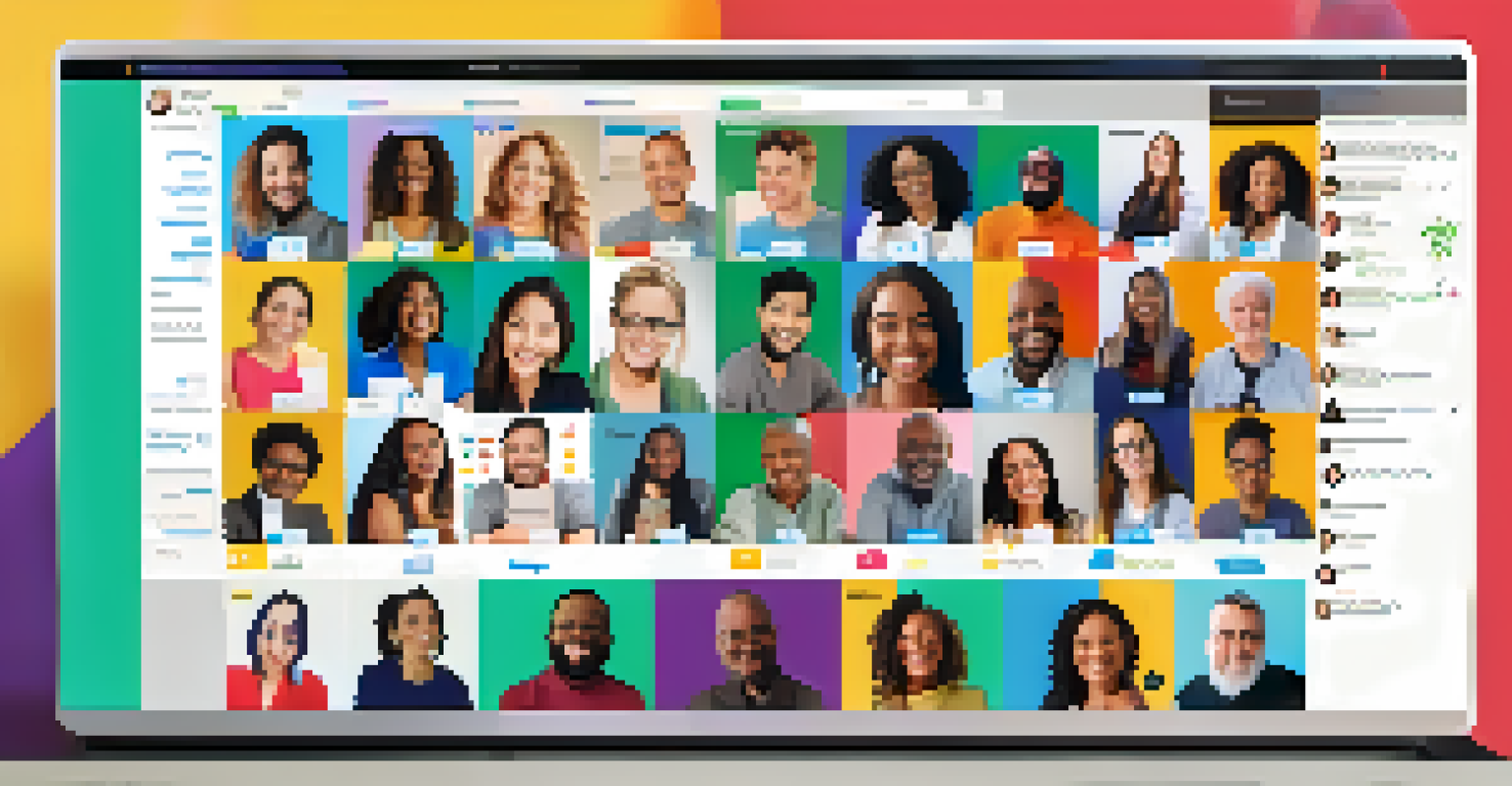Social Media: A Source of Support or Stress?

Understanding Social Media's Dual Nature
Social media has revolutionized the way we connect with others, offering both support and stress. While platforms like Facebook and Instagram allow us to reach out to friends and family, they can also amplify feelings of anxiety and pressure. This duality makes it essential to examine how these platforms affect our mental health. By understanding both sides, we can navigate the digital landscape more effectively.
Social media is not just a tool; it’s a bridge that connects us to others, but it can also create barriers that make us feel isolated.
On one hand, social media provides a lifeline for those feeling isolated. For example, online support groups can connect individuals with similar experiences, fostering a sense of belonging. People often share triumphs and challenges, which can inspire and uplift others in similar situations. This supportive network is particularly valuable for those facing mental health issues or other life challenges.
On the flip side, social media can become a breeding ground for stress. The constant comparison to curated lives can lead to feelings of inadequacy. Additionally, the pressure to maintain an online persona can be overwhelming, making users feel they must always present their best selves. Recognizing these stressors is crucial for maintaining a healthy relationship with social media.
The Supportive Side of Social Media
One of the key benefits of social media is the ability to cultivate supportive communities. For instance, platforms like Twitter and Reddit host numerous groups where individuals can share their experiences and seek advice. These interactions can provide comfort and valuable insights, making users feel less alone. The anonymity of some platforms can also encourage more open conversations.

Moreover, social media allows for the rapid dissemination of information and resources. Users can share mental health resources, coping strategies, and self-care tips with just a few clicks. This accessibility enables individuals to learn from one another and discover new ways to manage their stress. In times of crisis, timely information shared on social media can be a lifeline for many.
Social Media: A Double-Edged Sword
While social media can foster connection and support, it can also amplify stress and anxiety.
Additionally, social media can serve as a space for activism and awareness. Campaigns that promote mental health awareness or combat stigma often gain traction online, creating a sense of unity among supporters. This collective effort can empower individuals and instill hope, reinforcing the idea that they are not alone in their struggles.
The Stress Induced by Social Media
Despite its benefits, social media also brings considerable stress into our lives. The pressure to respond to messages, maintain engagement, and keep up with trends can be overwhelming. Many users find themselves caught in a cycle of checking notifications, leading to burnout and anxiety. This constant connectivity can hinder real-life relationships and create a sense of disconnection.
We are increasingly connected, but we are also increasingly isolated.
Another significant stressor is the phenomenon of cyberbullying. Online harassment can have devastating effects on individuals, particularly young people. The anonymity of the internet often emboldens negative behavior, making it easier for bullies to target their victims. This toxic environment can lead to decreased self-esteem and increased mental health issues.
Moreover, exposure to distressing news and negative content can contribute to a heightened sense of fear and anxiety. The algorithm-driven nature of social media often prioritizes sensationalized content, which can skew our perception of reality. This can leave users feeling deflated and overwhelmed, highlighting the importance of being mindful of the content we consume.
Finding Balance: Strategies for Healthy Usage
To harness the supportive aspects of social media while minimizing stress, finding a balance is crucial. One effective strategy is setting boundaries around usage. Designating specific times for social media can help manage the impulse to scroll endlessly. By being intentional about our online time, we can engage more meaningfully with our communities.
Another approach is curating our feeds to prioritize positivity. Following accounts that inspire, educate, or uplift can transform our online experience. Unfollowing or muting accounts that evoke negative feelings is equally important. This intentional curation can create a more supportive digital space, promoting mental well-being.
Cultivating Positive Online Spaces
Curating social media feeds to prioritize uplifting content can enhance mental well-being.
Lastly, practicing digital detoxes can work wonders for mental health. Taking breaks from social media allows us to reconnect with ourselves and the world around us. Engaging in offline activities can reduce stress and foster real-life connections, reminding us that while social media is a tool, it shouldn't replace face-to-face interaction.
The Role of Influencers in Mental Health Awareness
Influencers play a significant role in shaping conversations about mental health on social media. Many use their platforms to share personal stories, fostering a sense of connection with their followers. This openness can help reduce stigma and encourage others to seek support if needed. By normalizing discussions around mental health, influencers can make a positive impact on their audiences.
Moreover, influencers often promote mental health resources and self-care practices. They can introduce their followers to tools and strategies that may help improve their mental well-being. For example, a fitness influencer might share mindfulness techniques alongside workout routines, illustrating the connection between physical and mental health.
However, it's important to approach influencer content critically. Not all advice is created equal, and followers should discern what resonates with their individual needs. Engaging with diverse perspectives can provide a more comprehensive understanding of mental health and support the quest for balance.
Social Media and Mental Health Research
Research on social media's impact on mental health is continually evolving, revealing both positive and negative effects. Studies indicate that while social media can foster connections, excessive use may lead to increased feelings of loneliness and anxiety. Understanding these dynamics can help users make informed choices about their online habits, promoting healthier interactions.
Additionally, researchers are exploring how different demographics experience social media. For instance, teenagers may face unique challenges, such as peer pressure and cyberbullying, that can affect their mental health. This nuanced understanding highlights the importance of tailoring strategies to specific age groups and individual needs.
Mindful Usage Strategies Matter
Setting boundaries and taking breaks from social media are essential for maintaining a healthy relationship with these platforms.
As the digital landscape evolves, ongoing research will be essential for understanding the long-term effects of social media on mental health. By staying informed, users can adapt their engagement strategies and prioritize their well-being in an ever-changing environment.
Conclusion: Navigating Social Media Mindfully
In conclusion, social media serves as both a source of support and stress in our lives. By embracing the positive aspects, such as community and information sharing, we can enhance our well-being. However, it’s equally important to recognize and mitigate the stressors that come with these platforms.
Navigating social media mindfully means setting boundaries, curating our feeds, and taking breaks when necessary. By prioritizing our mental health, we can create a healthier relationship with social media that supports us rather than drains us. Remember, it's all about balance and finding what works best for you.

As we continue to engage with these digital spaces, let’s strive to foster positivity and support within our online communities. Together, we can transform social media into a tool for connection and understanding, rather than a source of stress.